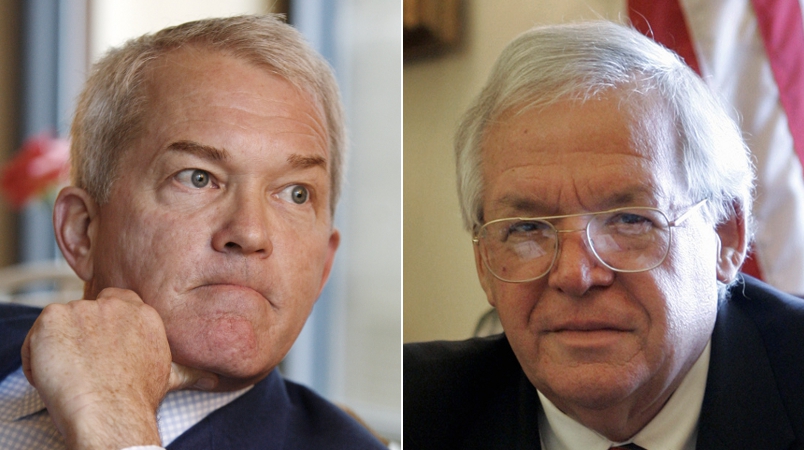The criminal case that rocked former House Speaker Dennis Hastert (R-IL) in recent days has cast a new, ugly pall over his handling of another ex-congressman’s sexual misconduct scandal almost a decade ago.
Hastert was indicted Thursday on charges of illegally withdrawing cash to avoid reporting requirements and lying to the FBI about those withdrawals. He’d allegedly taken out $1.7 million of $3.5 million total he’d agreed to pay towards a person identified in the indictment only as “Individual A,” a resident of Yorkville, Illinois, where Hastert taught and coached wrestling. The indictment said Hastert was compensating the person for “prior misconduct” that had occurred years earlier.
Later reports, based on anonymous federal law enforcement sources, said that “Individual A” was a male student and that alleged sexual abuse occurred while Hastert taught at Yorkville High School.
The dynamics at play in Hastert’s case are similar to those at work in the case of ex-Rep. Mark Foley (R-FL), who resigned from Congress in 2006 in a scandal over sexually explicit messages he sent high school-age, male interns. Hastert’s handling of the Foley affair itself was criticized as a cover-up, and it became a contributing factor to the GOP’s heavy midterm losses that fall.
Hastert originally maintained that he didn’t know about the explicit emails between Foley and members of the congressional page program until they were published in the news media, but a congressional ethics investigation later found the former House speaker knew much more than he let on.
Here’s how it all went down: ABC News published a series of emails and instant messages in late September 2006, prompting Foley’s resignation within 48 hours. In reaction, Hastert said the messages had been totally new information to House Republican Leadership when ABC News published them.
“The instant messages, reportedly between Congressman Foley and a former page sent in 2003, are vile and repulsive to me, and to my colleagues,” he said at the time. “No one in the Republican Leadership, nor Congressman Shimkus [who oversaw the page program], saw those messages until last Friday when ABC News released them to the public. When they were released, Congressman Foley resigned. And I’m glad he did, if he had not, I would have demanded his expulsion from the House of Representatives.”
Yet that conflicted with statements from Reps. John Boehner (R-OH) and Tom Reynolds (R-NY), who said they’d informed Hastert of Foley’s explicit messages in the spring of 2006. This New York Times interactive from the time showed the discrepancies in accounts of who knew what, and when. Hastert eventually took responsibility for the debacle, even if he didn’t admit prior knowledge of the allegations against Foley.
But a House Ethics Committee report released in December 2006 found that the “weight of the evidence” showed Hastert did know about explicit email messages Foley sent one page from Louisiana, while some of Hastert’s aides had known about Foley’s conduct around pages for years prior. The report determined that Hastert and other House Republicans did not violate any rules in their handling of the matter, however. Foley was not charged with a crime.
Still, Hastert’s handling of the Foley scandal dogged him. When Democrats seized control of the chamber in the midterm elections, it ended Hastert’s run as the longest-serving Republican House speaker and prompted him to leave Congress in 2007.
Now, Hastert faces his own scandal with allegations of a cover-up. It has already cost him his job at the lobbying firm he was working for, his spot on a corporate board, and his role at a center at Wheaton College that bears his name.
Foley did not immediately respond on to a message TPM left at a number listed for his West Palm Beach, Florida real estate firm requesting comment on the allegations against Hastert.
In light of what we now know about the secrets of his own Hastert was allegedly harboring, his condemnation of Foley back in 2006 drips with irony: “Congressman Foley duped a lot of people. … I have known him for all the years he served in this House. He deceived me, too.”







While Hastert was Speaker at that time, the real problem was the Chair of the Page Board, John Shimkus (R-IL-12). Shimkus knew about the inappropriate contacts for at least 4 years. He concealed them from other members of the Page Board, and possibly from the leadership as well. He has never been held to account for his culpability in this matter, which is central. He continues to be a member of the House inner circle, despite his reprehensible conduct as accessory after the fact for molestation and possibly rape.
Look folks nothing new here just one family values GOP pervert covering for another family vales GOP pervert
Huh. Sexually repressed white males covering up for each other in the name of “Family Values”. Which family I wonder? The Corleones?, THe Duggars?, The Sopranos?
As we see time and again in cases like this (look at Bill Cosby), when one incident is finally exposed, we always learn there were many more.
This is probably just the tip of the iceberg for everything that’s been going on with the Republicans. Hastert, then his supposed replacement was found to be screwing other women and interns while he was married, and Foley, and Gingrich (3 marital affairs).
What next? Will Fox News make Hastert part of their gang!..they welcomed Newt Gignrich and of course fromer GE CEO Jack Welch (another one who forced himself on subordinates).
They went after Clinton…and it turns out that Clinton’s affaird with Monica was consensual and she was an ADULT!
Hastert raped under aged students in his high school! He needs to go to jail! Heck, Newt Gingrich should be in jail!
“…Hastert did know about explicit email messages Foley sent…”
Yet Hastert accused everyone else of lying, in a display of true conservative values.